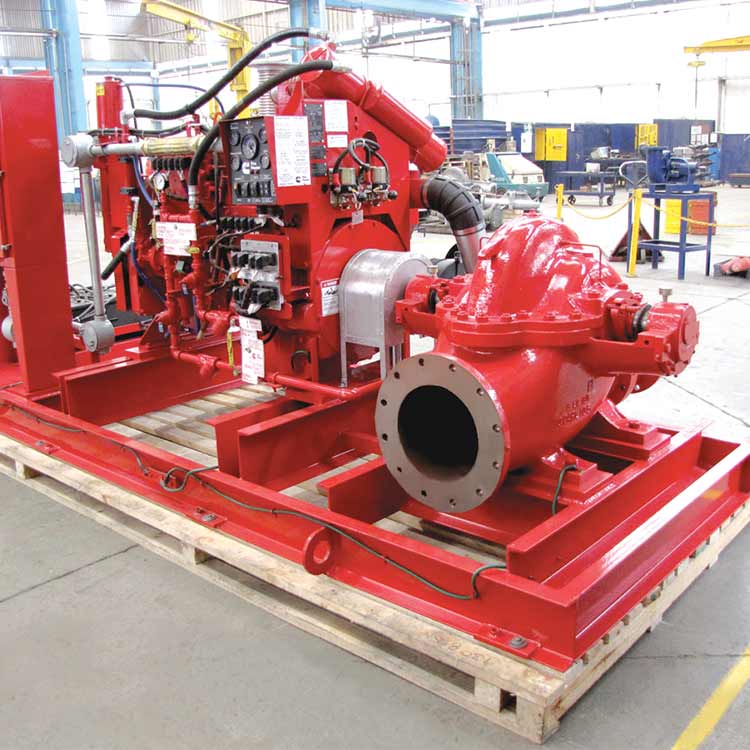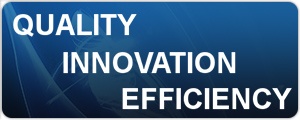Fire Pumps: the invisible firefighter
Usually found in manufacturing facilities, housing complexes, power plants, schools, hospitals, airports, commercial buildings and oil platforms, a fire pump is the heart of your fire suppression system.
Even before the fire station has been informed and fire brigade personnel come into action, fire pumps are ready to rescue us from a catastrophic disaster. A fire pump is the component responsible for supplying adequate water pressure to fire sprinklers and hose standpipes in order to control or contain a fire.

What types of fire pumps exist?
Centrifugal pumps are most commonly used in fire protection systems, these include: horizontal split case, horizontal end suction, vertical turbine and vertical in-line. These pumps are commonly powered either by an electric motor or a diesel engine.
Additionally, a pressure maintenance pump for small low-flow and relatively high-pressure, commonly known as Jockey pumps, are provided in a firewater system to keep the fire system pressurized during non-fire conditions and prevent unnecessary cycling of the main fire pump.
How does a fire pump work?
Fire pumps are designed to start automatically when the water pressure drops below a threshold in a fire system. Pressure drops occur when one or more sprinkler heads or a hose standpipe open and discharge water.
It is important to mention that, contrary to popular belief, sprinklers are not triggered by smoke and they do not all go off at once. If that were the case, sprinkler systems would cause more harm than good, soaking all your assets. The only sprinkler heads that activates are the ones directly subject to the heat caused by a fire.
Each sprinkler head has a small glass bulb that holds a heat sensitive liquid inside. When the ambient temperature of the liquid reaches a certain level, typically 57-77 degrees Celsius, it will expand the liquid and break the bulb, which in turn releases water from the sprinkler head. It is important to mention that most fires usually require one or two sprinkler heads to be contained or extinguished.
Be sure that your fire fighting pump system is compliant with the latest codes and standards
Making sure your fire suppression pump system complies with security norms and standards is essential for your safety. All fire pump installations should meet the requirements of local regulations and applicable fire codes.
Fire pumps must be tested and listed by authorized and recognized laboratories like Underwriter's Laboratory (UL) and listed by accredited agencies such as Factory Mutual (FM).
Additionally, the installation of your fire suppression system must comply with the latest edition of NFPA 20 standard. The National Fire Protection Association (NFPA) is a global nonprofit organization, established in 1896, devoted to eliminating death, injury, property and economic loss due to fire, electrical and related hazards.

Inspection, Testing and Maintenance of a Fire Pump System
Fire pumps and their associated components require regular testing, inspection, service and maintenance to guarantee proper functioning. To help ensure the reliable operation of the pump at the critical stage of an incident, qualified personnel should carry out regular visual inspections and running tests. This includes, but is not limited to, checking water supply & pump suction conditions, discharge piping and valves, electrical system conditions engine consumables levels, etc. It is important to make sure that the inspections are performed at the right intervals and that they are properly documented.
In order to meet both federal certification requirements and state licensure requirements, automatic fire pump systems are required to be inspected, tested and maintained in accordance with NFPA 25, Standard for the Inspection, Testing, and Maintenance of Water-Based Fire Protection Systems.
With a solid reputation built since its birth in 1950, Ruhrpumpen has designed and manufactured thousands of custom and pre-packaged fire pump systems that are chosen by hundreds of manufacturing facilities, refineries, offshore platforms, municipal buildings and commercial sites around the world.
If you have questions about your fire system or need assistance, please contact your closest Ruhrpumpen's sales office for more information.
